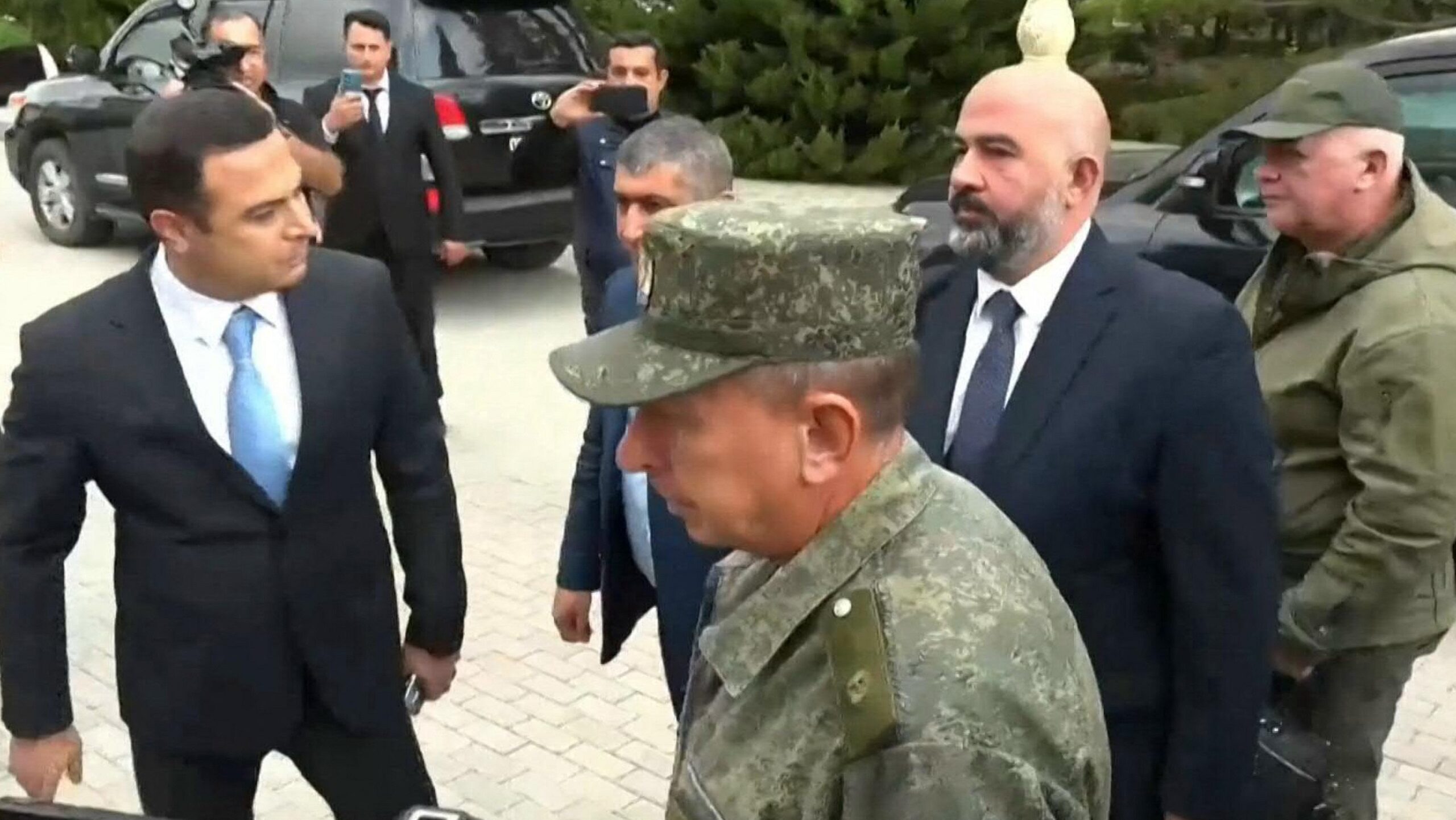Azerbaijan, Armenian Separatists To Discuss Nagorno-Karabakh Conflict in Yevlakh Talks
Baku halted its military operation on local Armenian forces in the disputed Nagorno-Karabakh territory
Azerbaijan will hold talks with Armenian separatists on Thursday after a cease-fire was reached following a military operation that Baku had launched in the disputed territory of Nagorno-Karabakh.
While this territory is internationally recognized as belonging to Azerbaijan, most people living there, believed to be about 145,000, are ethnic Armenians.
The talks will be held in the town of Yevlakh, north of Nagorno-Karabakh, with representatives of the Armenian community living in the area. However, Baku threatened to continue fighting, according to a government statement shared by Azerbaijan’s state news agency.
For the antiterror measures to stop, the illegal Armenian military formations must raise the white flag, all the weapons must be handed over, and the illegal regime must be dissolved
“For the antiterror measures to stop, the illegal Armenian military formations must raise the white flag, all the weapons must be handed over, and the illegal regime must be dissolved. Otherwise, the antiterror measures will be continued until the end,” the statement read.
The Russian Defense Ministry, which brokered a cease-fire after a 2020 war, stated that a cease-fire agreement was reached with the help of the command of Russian peacekeepers.
The Russian Foreign Ministry released a statement hours before the cease-fire was announced, urging the hostilities to stop.
In the agreement, the local Armenian leadership in the territory agreed to disarm its forces.
Azerbaijan claimed it was carrying out an “anti-terrorist operation” after what it said were the killing of four soldiers and two civilians by mines.
Thousands of civilians have gone to the Stepanakert airport in Nagorno-Karabakh amid shelling in the area.
This holiday season, give to:
Truth and understanding
The Media Line's intrepid correspondents are in Israel, Gaza, Lebanon, Syria and Pakistan providing first-person reporting.
They all said they cover it.
We see it.
We report with just one agenda: the truth.


We are close to a peace treaty between Armenia and Azerbaijan based on their territorial integrity within their internationally recognized borders
Özgür Ünlühisarcıklı, the German Marshall Fund’s Ankara office director, stated he was hopeful that a resolution was near and that it could support ties between Turkey, Europe, and Central Asia.
“We are close to a peace treaty between Armenia and Azerbaijan based on their territorial integrity within their internationally recognized borders,” he wrote in a message to The Media Line.
Turkish President Recep Tayyip Erdoğan backed Baku during a speech at the UN General Assembly on Tuesday, reiterating Turkey’s support for its long-time ally.
Ünlühisarcıklı said that Azerbaijan’s increasing strength in the region is a boost to Turkey’s position in the South Caucasus, including against Iran, a rival to Ankara that supports Armenia.
Turkey’s support for Azerbaijan went against the condemnation of the country’s operation by some of Ankara’s most important Western allies.
Germany Foreign Minister Annalena Baerbock wrote on X, formerly known as Twitter, that Azerbaijan broke a promise to not carry out military action on Tuesday.
The account of US Senator Bob Menendez, who heads the US Senate Foreign Relations Committee, wrote that the president of Azerbaijan wanted to “wipe out the Armenian population there.”
While ties have improved, Turkey’s poor relations with Armenia have been a point of contention in its relations with Washington.
In 2021, the US recognized as “genocide” the mass killing of Armenians more than 100 years ago by the Ottoman Empire, which preceded the Turkish Republic.
Ankara immediately rejected the statement, saying it was driven by “populism.”
Moscow’s role in supporting Armenia and reaching a cease-fire in 2020 complicated matters for Turkey, which has strengthened relations with Russia in recent years and has maintained ties throughout its full-scale invasion of Ukraine.
Aydin Sezer, an Ankara-based foreign policy analyst, stated that ties between Ankara and Yerevan have recently improved, with Erdoğan and Armenian Prime Minister Nikol Pashinyan engaging in regular communications.
“If this issue is resolved, the process of normalization between Turkey and Armenia will accelerate,” he wrote in a message to The Media Line.
Gallia Lindenstrauss, a senior research fellow at the Institute for National Security Studies who specializes in the foreign policy of Turkey and Azerbaijan at Tel Aviv University, warned that while a surrender by Armenians could exacerbate grievances in the long run with the Armenian diaspora, many of whom live in the US, it would help negotiations in the near term.
Azerbaijan has also been supported by Israel and appointed its first ambassador to Israel this year.
Lindenstrauss stated that these ties can be a boost to Israeli-Turkish relations, which are going through a rapprochement.
“Israel-Azerbaijani relations are blossoming, and they are much more in the public than before. Azerbaijan sees its weapons purchases from Israel as something that contributed to its military success and hence very much appreciated. This has also had a very positive trickling effect on Turkish-Israeli relations,” Lindenstrauss wrote in a message to The Media Line.

